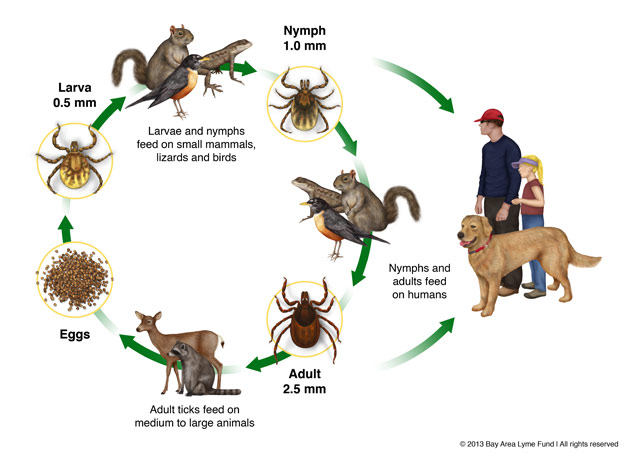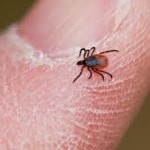ticks
now browsing by tag
Protect Yourself From Lyme Disease

 What is Lyme disease? Lyme disease is an infection caused by a spirochete that humans can get from the bite of an infected deer tick. The spirochete’s scientific name is Borrelia burgdorferi.
What is Lyme disease? Lyme disease is an infection caused by a spirochete that humans can get from the bite of an infected deer tick. The spirochete’s scientific name is Borrelia burgdorferi.
It was first discovered in Lyme, Connecticut a quaint little town with a population of around 2k. In the early 1970s a group of children and adults in Lyme, Connecticut, and the surrounding areas were suffering from some puzzling and debilitating health issues. Their symptoms included swollen knees, paralysis, skin rashes, headaches, and severe chronic fatigue. Visits with doctors and hospital stays had become all too common.
Physicians began to study the group’s symptoms and looked for several possible causes. What was causing all these debilitating symptoms? What added to the mystery were the reported skin rashes followed very quickly by arthritic conditions. Most of the people recalled being bitten by a tick in the region. Residents of Lyme began calling it Lyme disease, but they still didn’t know what caused it.
In 1981, a scientist, Willy Burgdorfer, who was studying Rocky Mountain Spotted Fever (also caused by a tick bite) began to study Lyme disease. He found the connection between the deer tick and the disease and gave the bacteria causing the illness a name, Borrelia burgdorferi. Therefore, antibiotic treatment could be used to “eradicate” the disease.
This treatment is currently accepted by the medical profession and has been largely successful, especially for those with early-stage Lyme disease. However, there continues to be heavy debate on the long-term use of antibiotics for Lyme that has progressed or appears resistant to a short course of antibiotics.
In 2012, Lyme disease was included as one of the top ten notifiable diseases by the Centers for Disease Control and Prevention (CDC).
Lyme disease is one of the fastest-growing infections in the United States. The CDC estimates that there are 300,000 new cases of Lyme disease each year here in the US. While it was primarily an East Coast phenomenon in the beginning, it has since been reported in all states except Hawaii. (Note: I now live in Sarasota, FL and my veterinarian has told me we do not have Lyme disease in Sarasota, YET. This was after I ran to the veterinarian’s after finding a small tick on my dog.)
I recall when the first time I saw a person with Lyme Disease (20 years ago). I was living in Upstate NY and had met her through some friends. She was obviously physically ill, could hardly walk, and just returned from Mexico were she had undergone an experimental treatment for Lyme disease. It was sad to see, shocking really, and she was exhausted and went home as the rest of us escorted her husband to dinner. I wonder if she is still alive as that was the only time I ever saw her, and her condition was terrible.
As the years went on, I would hear of more and more friends and acquaintances having brushes with Lyme disease. Stories of picking nasty ticks off of body parts after hikes in the woods, a dentist hooked up to an IV of antibiotics as he continued to work on patient’s teeth, or a business man who could no longer run his business because of the disease, continued to send terror into our community.
Now it is 2015, and people are afraid to walk in the woods, garden in their yards, or let their kids play soccer in fear they will pick up a deer tick. And pets are not immune. My friend’s dogs have had Lyme disease, however there is now a vaccination for dogs but not available for humans.
Why were we able to play outside as children and never worried about being infected with Lyme disease? Is it the result of a scientific experiment gone haywire? According to the website http://nstarzone.com/LYME.html it was the US government that created Lyme disease. Their conspiracy theory is that a scientist was experimenting by infecting ticks with a deadly disease as part of biological warfare on Plum Island outside of Long Island and only 10 miles from Lyme, Connecticut. Hmmmm
The History of Plum Island CLICK HERE
Some scientists say that Lyme disease has been around for years and it is just taking this long to spread to your particular area. A German physician, Alfred Buchwald, first described the chronic skin rash, or erythema migrans, of what is now known to be Lyme disease more than 130 years ago.
Here are some precautions to take to prevent YOU from being infected with Lyme disease:
- Wear white clothing so you can see the ticks and tuck pants into socks when you go for hikes.
- Stay on sidewalks and roads. Ticks like grassy areas.
- Stand in front of a mirror and examine yourself front and back after being outside doing lawn care or gardening. etc.
- Consider DEET for skin and PERMETHRIN for your clothes. A single application of permethrin to your clothing can provide up to six weeks of protection, even after repeated washings. LEMON EUCALYPTUS OIL is believed to repel ticks and several all-natural organic sprays now exist on the market.
- Check your dogs and cats for ticks when they come into the house.
- You can try making your own tick repellant: (I’m not sure how well it works.)
- 12 drops lemongrass
- 6 drops eucalyptus
- 2 drops citronella
How to remove a tick:
- Use fine-tipped tweezers to grasp the tick as close to the skin’s surface as possible.

- Pull upward with steady, even pressure. Don’t twist or jerk the tick; this can cause the mouth-parts to break off and remain in the skin. If this happens, remove the mouth-parts with tweezers. If you are unable to remove the mouth easily with clean tweezers, leave it alone and let the skin heal.
- After removing the tick, thoroughly clean the bite area and your hands with rubbing alcohol, an iodine scrub, or soap and water.
- Dispose of a live tick by submersing it in alcohol, placing it in a sealed bag/container, wrapping it tightly in tape, or flushing it down the toilet. Never crush a tick with your fingers.
Symptoms of Lyme disease:
- A flu-like feeling
- Joint aches and pains
- Rash around the site of the tick bite
- Fever
- Sore throat
- A constant headache
- Depression
- Exhaustion
Most people that develop Lyme disease never develop the classic bulls-eyed rash.
Most people with Lyme disease never test positive for Lyme in early blood test.
A small percentage of people are NOT CURED with antibiotics.
It is important to get treatment as soon as possible if you suspect your were bitten by a deer tick. If Lyme disease is not diagnosed and treated early, the Lyme spirochetes can spread and may go into hiding in your body. Weeks, months or even years later you may have problems with your brain and nervous system, muscles and joints, heart and circulation, digestion, reproductive system, and skin. Symptoms may disappear even without treatment and different symptoms may appear at different times.
The most common  antibiotics prescribed for Lyme Disease is amoxicillin, doxycycline, tetracycline and penicillin. The length of antibiotic treatment varies according to how bad the disease and your symptoms are, but treatment generally lasts less than 4 weeks.
antibiotics prescribed for Lyme Disease is amoxicillin, doxycycline, tetracycline and penicillin. The length of antibiotic treatment varies according to how bad the disease and your symptoms are, but treatment generally lasts less than 4 weeks.
What happens if you do not get better with treatment?
Chronic Lyme disease happens when a person does not seek treatment in time or does not adequately respond to standard antibiotic treatment. Usually your doctor will prescribe more antibiotics or a course of IV antibiotics. Each patient’s case is different.
In the case with the woman I met 20 years ago, she was not responding well with conventional therapy and chose an alternative medical treatment in Mexico. You can Google alternative treatment centers for more info but make sure you do your research before spending your money.
Spring is coming and that means the ticks will come out of hiding. Be careful when you are outside and stay tick-free!
Thanks for reading!
Terry Ryan, Blogger
Terry Ryan is a website designer, social media expert and blogger. She lives in Sarasota, FL. http://www.internetboomer.com




 D5 Creation
D5 Creation